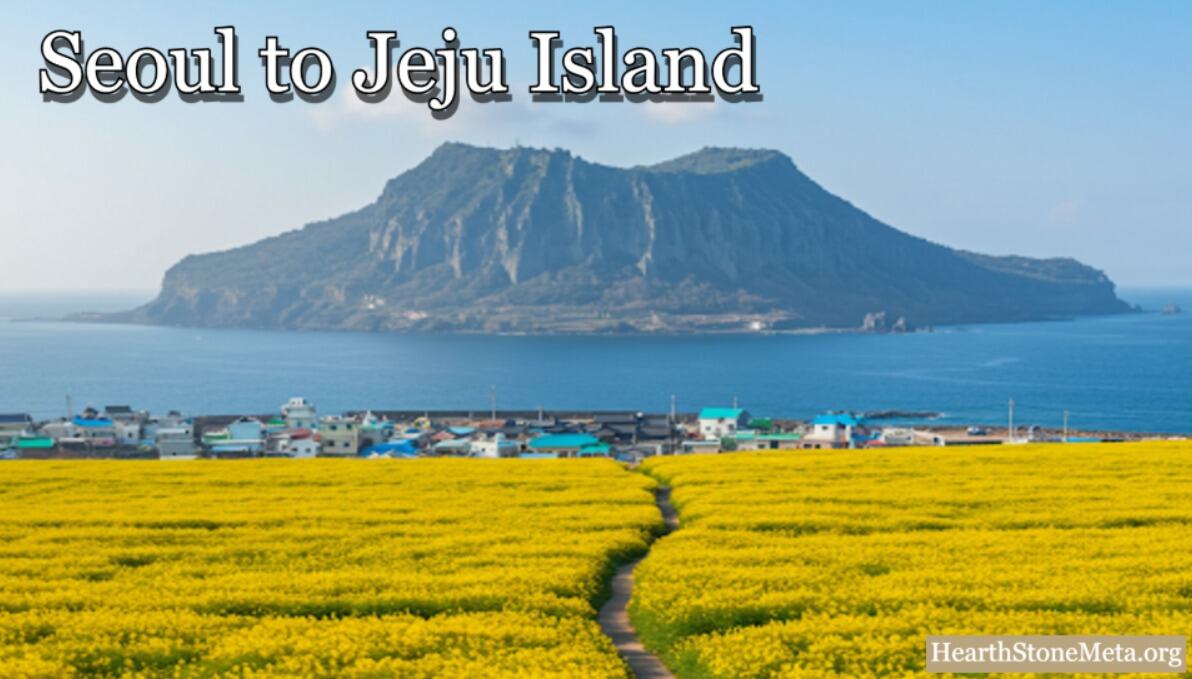Introduction
Jeju Island, often referred to as the “Hawaii of South Korea,” is a dream destination for travelers and expatriates alike.
With its volcanic landscapes, pristine beaches, and mild climate, it’s no wonder that thousands make the trip from Seoul to Jeju Island every year.
Whether you’re looking for a short vacation or considering Jeju as your new home, this guide will walk you through all the essentials.
How to Travel from Seoul to Jeju Island

Flight Options
Traveling from Seoul to Jeju Island is incredibly convenient, thanks to frequent domestic flights. Some of the major airlines that operate this route include:
- Korean Air
- Asiana Airlines
- Jeju Air
- T’way Air
- Jin Air
Flights from Gimpo International Airport (GMP) to Jeju International Airport (CJU) take about 1 hour and 10 minutes, making it one of the busiest air routes in the world.
Best Time to Book Flights
For budget-conscious travelers, booking flights at least one to two months in advance can result in significant savings. The cheapest fares are usually available in the off-peak seasons (March-May and September-November).
Alternative Travel Options
Although flights are the fastest option, you can also travel by ferry. A ferry ride from Mokpo Port to Jeju Island takes about 4-5 hours, providing a scenic maritime experience.
Top Attractions in Jeju Island
1. Hallasan National Park
At the heart of Jeju Island, Hallasan Mountain is a dormant volcano and the highest peak in South Korea. Hiking enthusiasts can enjoy scenic trails leading to breathtaking crater views.
2. Seongsan Ilchulbong (Sunrise Peak)
This UNESCO World Heritage site is famous for its spectacular sunrise views. The short but steep hike to the top is well worth the effort.
3. Jeju Loveland
A unique and artistic theme park, Jeju Loveland showcases adult-themed sculptures and is one of the most unusual attractions on the island.
4. Manjanggul Lava Tube
For those interested in geological wonders, Manjanggul Cave offers an underground adventure through one of the longest lava tubes in the world.
5. Jeju’s Beaches
- Hyeopjae Beach: White sand and turquoise waters
- Jungmun Beach: Popular for surfing
- Hamdeok Beach: Great for families with shallow waters
Why Live in Jeju Island?

1. Cost of Living
Compared to Seoul, Jeju Island offers a lower cost of living. Rent, food, and transportation are significantly cheaper, making it an attractive place for long-term stays.
2. Quality of Life
Jeju boasts a clean environment, fresh air, and a slower-paced life, ideal for retirees, digital nomads, or those looking for a peaceful lifestyle.
3. Education and Healthcare
Jeju has high-quality schools, international institutions, and well-equipped hospitals, making it a suitable place for families.
4. Expat Community
There is a growing expat community in Jeju, with many foreigners choosing to live and work on the island, particularly in the education and tourism sectors.
Best Areas to Stay in Jeju
- Jeju City: Perfect for urban living with great accessibility
- Seogwipo: Scenic coastal town with a laid-back vibe
- Aewol: Known for its trendy cafes and ocean views
Jeju Island’s Culture and Cuisine
1. Traditional Jeju Cuisine
Jeju Island is famous for its unique culinary experiences, including:
- Black Pork BBQ – A specialty of Jeju with a rich and smoky flavor.
- Abalone Porridge – A delicacy known for its nutritious benefits.
- Jeju Tangerines – Fresh and sweet, these tangerines are a must-try.
2. Cultural Festivals in Jeju
Jeju Island hosts several cultural and seasonal festivals, such as:
- Jeju Fire Festival: Celebrates traditional fire-based rituals.
- Seogwipo Citrus Festival: Showcases the island’s famous tangerines.
- Jeju Cherry Blossom Festival: A breathtaking display of cherry blossoms in spring.
Outdoor Activities in Jeju Island
1. Water Sports and Diving
Jeju Island is an excellent location for scuba diving, snorkeling, and kayaking due to its clear waters and diverse marine life.
2. Cycling Around Jeju
The Jeju Olle Trails and coastal roads make the island a haven for cyclists who enjoy scenic landscapes.
3. Horseback Riding
Jeju is home to native Jeju horses, and visitors can experience horseback riding on designated ranches.
Tips for First-Time Travelers to Jeju Island

1. Best Time to Visit
The best seasons to visit are spring (March-May) and autumn (September-November) when the weather is pleasant, and the landscapes are vibrant.
2. Transportation on the Island
- Public Buses: Affordable and convenient.
- Car Rentals: Ideal for exploring remote areas.
- Taxis: available but more expensive than buses.
3. Local Etiquette and Safety
- Bow slightly when greeting locals.
- Carry cash, as some rural areas may not accept cards.
- Always respect nature and cultural heritage sites.
Conclusion
A trip from Seoul to Jeju Island is more than just a flight, it’s an experience filled with adventure, relaxation, and opportunity.
Whether you’re visiting for a few days or thinking about making it your home, Jeju’s beauty and vibrant culture will leave a lasting impression.
Plan your journey today and discover why Jeju Island is South Korea’s paradise!
